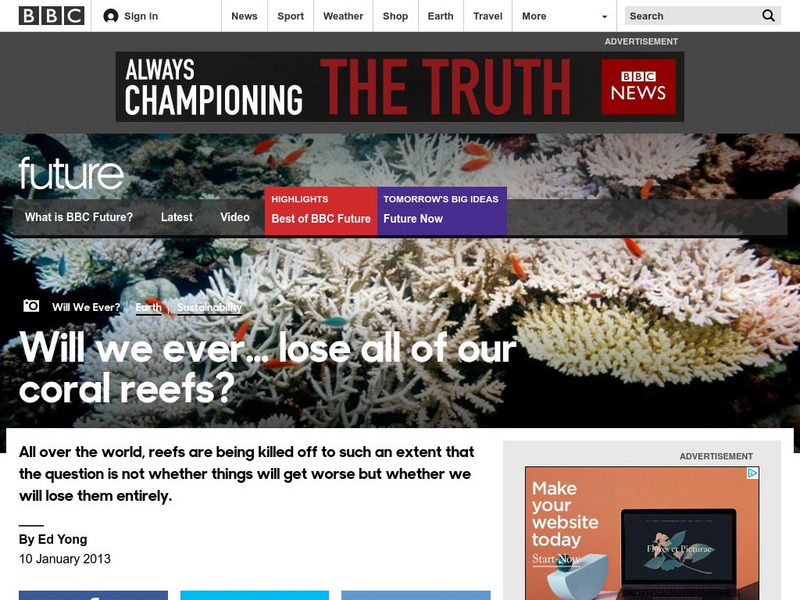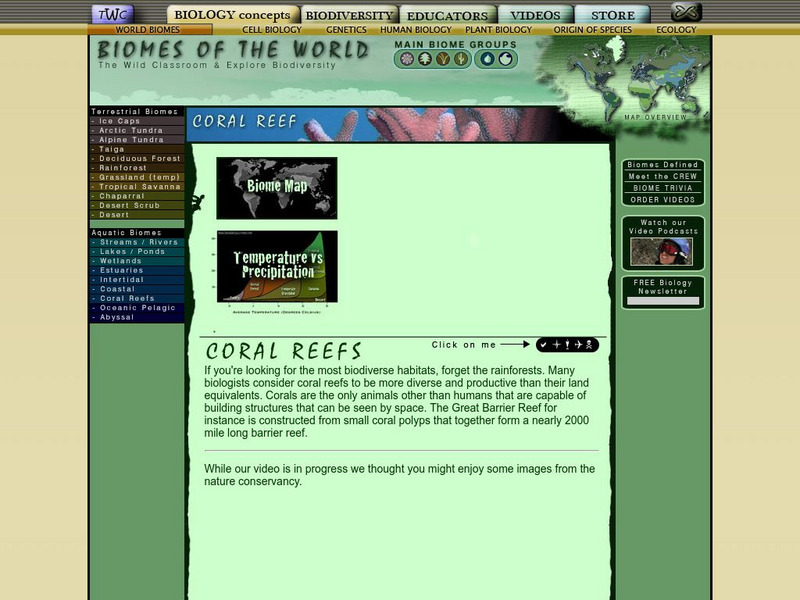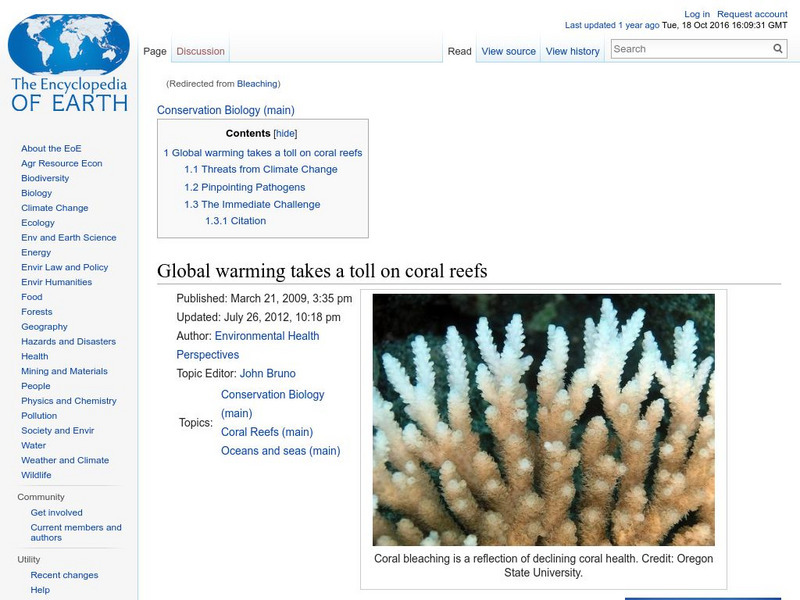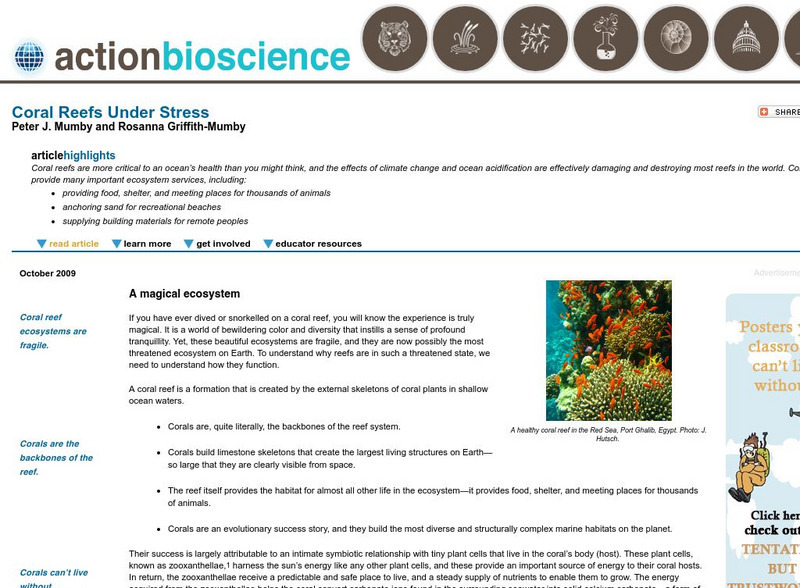Smithsonian Institution
Smithsonian Learning Lab: Contrasts in Blue: Life on the Caribbean Coral Reef and the Rocky Coast of Maine
Smithsonian Education presents Contrasts in Blue: Life on the Caribbean Coral Reef and the Rocky Coast of Maine. Teachers can download this comprehensive teaching package in which students explore two marine ecosystems, the coral reefs...
BBC
Bbc Future: Week of 1 14 13: Will We Ever Lose All of Our Coral Reefs?
This article describes how climate change is impacting coral reefs around the world. Includes many photographs of coral reefs.
The Wild Classroom
The Wild Classroom: Biomes of the World: Coral Reef Biome
Learn about the coral reef ecosystem. Find out about plants, animals, adaptations, and conservation efforts.
National Geographic
National Geographic: Coral Reef Fish Survey Simulation
Students will learn surveying methods for an ecosystem through a short video. The video focuses on exploring the number and types of fish and the health of the coral reef ecosystem. Site includes a lesson plan and activity worksheet.
Nature Conservancy
The Nature Conservancy: Coral Reefs of Palau: Nature's Amazing Underwater Cities
This lesson takes students on a virtual field trip to the coral reefs of Palau where they will explore amazing underwater cities found near a remote network of islands in the Pacific Ocean. Learn all about an ecosystem of symbiosis....
Encyclopedia of Earth
Encyclopedia of Earth: Global Warming Takes a Toll on Coral Reefs
Article describing damage caused to coral reefs in the Caribbean after an extended period of extreme heat in 2005 that raised the ocean temperature in that area. The potential, devastating consequences to humans of coral reef destruction...
American Institute of Biological Sciences
Action Bioscience: Coral Reefs Under Stress
Coral reefs, home to many vibrant plants and animals, are suffering from the affects of climate change and the increase of acid in ocean waters. Delve into the benefits and concerns of these beautiful ecosystems.
Smithsonian Institution
National Museum of Natural History: Ocean Portal: Corals and Coral Reefs
Learn about corals and the importance of coral reefs to ocean ecosystems. Find out how reefs are created, what threats they face, and what kinds of conservation tactics are being used to protect and preserve them.
Center for Educational Technologies
Nasa Classroom of the Future: Coral Reefs: Dissappearing Resource
Why are the reefs disappearing? Use this site to explore the science behind the issue. Useful at several grade levels.
Missouri Botanical Garden
Missouri Botanical Garden: Tropical Oceans: Coral Reefs
An interesting site about coral reefs. It explores where the reefs are found, what the reefs are, animals that live in the reefs, and preservation of the reefs.
NOAA
Noaa: Ocean Explorer: Keeping Watch on Coral Reefs
Students read coral reef tutorials, describe the role of satellites, analyze oceanographic data, and identify actions to reduce threats to these fragile ecosystems. Their goal is to ultimately produce a public education program about...
NOAA
Noaa: Fisheries: Coral Reefs and the Endangered Species Act [Pdf]
Explore a comprehensive petition regarding the legal preservation of coral reefs and learn how the U.S. Endangered Species Act works to protect the reefs. PDF (requires Adobe Reader).
NOAA
Noaa: International Year of the Ocean: Pacific Coral Reef
"This [online] coral book was created to provide the reader with an introduction to the Pacific's fascinating coral reef ecosystem." The resource is for young students learning about life under the sea. Translated in English, Hawaiian...
Read Works
Read Works: Coral Reef Goes Digital
[Free Registration/Login Required] An informational text about sensors placed in Australia's Great Barrier Reef to record changes in the ocean. A question sheet is available to help students build skills in reading comprehension.
US Navy
Office of Naval Research: Coral Reefs
Characteristics, location/reef life, humans, and the environment are the topics explored in this competent site. A quick quiz can be found at the end of the text.
Texas A&M University
Ocean World: Bringing the Ocean to the Classroom
Online resource for students and teachers to see information on icebergs, fisheries, coral reefs, waves, currents and more. Provides teachers with learning activities. Has its own ask-an-expert site (Ask Dr. Bob), and provides real-time...
NOAA
Noaa: Ocean Service Education: Corals
This Coral Tutorial is an excellent resource with diagrams, pictures, animations and short videos. All aspects of coral biology are discussed. As an added benefit, pdf versions of the site are available along with a subject review...
Texas A&M University
Ocean World: Coral Reefs
Did you know that coral is actually an animal? This site uncovers information on these sea creatures as well as provides links to other coral reef sites.
Smithsonian Institution
National Museum of Natural History: Ocean Portal, You Navigate
Delight in the fresh colors, sights, and sounds on this dynamic site on the ocean. Major categories consist of Ocean Life & Ecosystems, The Ocean Over Time, Ocean Science, and The Ocean and You. New information on sharks, a slideshow...
Science Education Resource Center at Carleton College
Serc: Ocean World
A link to a website with information about the ocean. Learn about ocean processes, oceanography, physical oceanography, and get real-time ocean data. Site contains college-level and beyond textbook as well as teaching materials.
Science Education Resource Center at Carleton College
Serc: Earthlabs: Corals Unit Overview
Six lab investigations on corals expose students to some of the most current scientific research, data, and visualizations in a way that allows them to become active participants in both learning about and conserving coral reefs.
Tramline
Tramline, Inc.: Virtual Ocean Field Trip
In this enchanting site, students will learn basic principles about oceans and will be introduced to an assortment of sea life, both plant and animal. Other interesting ocean links can be found on the teacher resource section of this link.
Climate Literacy
Clean: Understanding Ocean Acidification
The following is a series of 5 activities regarding ocean acidifcation Students will learn about rising Carbon Dioxide in the atmosphere, climate change, ocean reefs, marine calcifers and ocean pH.



















